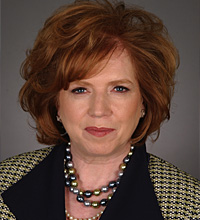Gender-based Leadership Styles
This is the first in a February series of Blogs from the FFI Board. Patricia Annino of Prince Lobel Tye explores the implications of “relational-cultural theory,” on leadership roles for women in family enterprises.
As we look forward to the 2015 annual conference, “Myths and Realities,” I began to reflect on the rising role of women in leadership in family businesses and what that means. Based on my more than three decades of working with family businesses I have observed that the leadership style of women is quite different than that of men. These are personal observations. Psychoanalyst Jean Baker Miller, the author of Toward a New Psychology of Women, and first director of the Stone Center at Wellesley College, developed the “Relational-Cultural Theory” with her colleagues. Their work suggests that all growth occurs in connection, that all people yearn for connection, and that growth-fostering relationships are created through mutual empathy and empowerment.
The other side of this is disconnection – when the relationship connections no longer work or have become uncomfortable. When this happens, if the less powerful person is able to express her feelings and the other person is able to respond empathetically, disconnection can actually lead to a strengthened relationship and a strengthened sense of relational competence. If, however, the injured or less powerful person is unable to express her feelings or receives a response of indifference, she will begin to keep aspects of herself out of the relationship in order to maintain the relationship.
This very complicated analysis is at the heart of the difference between men and women in the work force, and in my experience, working within the family business too. Because so much of what a woman values is the connection and the relationship with others, when that is not reciprocated or encouraged, it can impede a woman’s ability to succeed.
For the most part men, on the other hand, don’t have that problem. They measure their success on their individual ability to get ahead and are not as bogged down by how they are judged in relationships with others. Generally they are also not afraid of ruffling the feathers of those they work with to achieve success. The fear of controversy can impede women from attaining higher levels of success because women do not instinctively understand that ruffling feathers and creating controversy does not mean that the relationship will end; in fact, it can mean that working through that will improve the relationship and lead to greater success for all. Women are afraid to risk the relationship for personal reward. This fundamental difference in the way that men and women approach success in business is amplified when family is involved.
In a provocative example I asked three women in family business leadership positions if they competed for their position. In all three instances the immediate reaction was no. When I asked follow-up questions, “Didn’t your brother want the job too?” “Did someone just say now you are the president?” All three women changed their answer to “I guess I did compete but I really don’t think of it that way.”
For many women today overtly acknowledging competition is just not done. In the family business all of this is amplified. In addition to concerns about peer approval and connection there is still the holiday meal and what the rest of the family will think about their leadership of the family business and how they got there. To me, this means that as women, leadership in family business will continue to increase, what it means to the woman, the family business and the family itself will continue to evolve.
About the contributor:
 Patricia M. Annino is a partner at Prince Lobel Tye in Boston and chair of the firm’s Planning and Probate Practice Group. She has more than 25 years of experience serving the estate planning needs of families, individuals, and owners of closely held businesses. She was recently elected to the FFI board of directors for a four-year term. Patricia can be reached at pannino@princelobel.com.
Patricia M. Annino is a partner at Prince Lobel Tye in Boston and chair of the firm’s Planning and Probate Practice Group. She has more than 25 years of experience serving the estate planning needs of families, individuals, and owners of closely held businesses. She was recently elected to the FFI board of directors for a four-year term. Patricia can be reached at pannino@princelobel.com.
Yours in Practice,
The Practitioner




